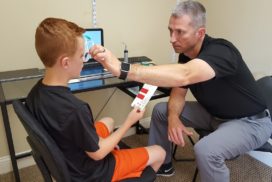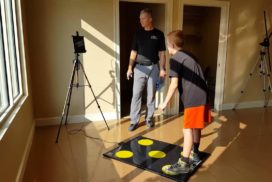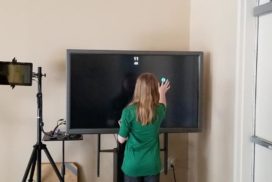Concussion Center at InFocus Eyecare
What is a Concussion?
A concussion (or mild traumatic brain injury) is a complex pathophysiological process affecting the brain, induced by traumatic biomechanical forces secondary to direct or indirect forces to the head. The adult brain is a 3 lb. organ that floats inside the skull. It is surrounded by cerebral spinal fluid which encases the brain in nutrient rich fluids and acts like a shock absorber protecting it from mild impacts. When the brain moves rapidly inside the skull, a concussion has technically occurred. Common scenarios that can lead to a concussion is a direct blow to the head or a whiplash effect to the body. The impact rapidly accelerates the head, causing the brain to strike the inner skull (i.e., the coup). When the head decelerates and stops its motion, the brain then hits the opposite side of the inner skull (i.e., the contre-coup).
The second common scenario is a rotational concussion, in which the head rapidly rotates from one side to another causing shearing and straining of brain tissues. In either case, delicate neural pathways in the brain can become damaged, causing micro-neurological and neurochemical disturbances referred to as an Energy Crisis.
It is for this reason that brain imaging (i.e., CT Scan, MRI) typically appear normal and do not reveal an injury. A concussion may or may not involve a loss of consciousness (90% of concussed do not lose consciousness) but results in a constellation of physical, cognitive, emotional, and sleep-related symptoms. Recovery is a sequential process and symptoms may last from several minutes to days, weeks, months, or even longer in some cases.
Concussion Symptoms
Signs and symptoms generally show up soon after the injury. However, you may not know how serious the injury is at first and some symptoms may not show up for hours or days. For example, in the first few minutes your child or teen might be a little confused or a bit dazed, but an hour later your child might not be able to remember how he or she got hurt.
- Headache or “pressure” in head.
- Nausea or vomiting.
- Balance problems or dizziness, or double or blurry vision.
- Bothered by light or noise.
- Feeling sluggish, hazy, foggy, or groggy.
- Confusion, or concentration or memory problems.
- Just not “feeling right,” or “feeling down”.
- Can’t recall events prior to or after a hit or fall.
- Appears dazed or stunned.
- Forgets an instruction, is confused about an assignment or position, or is unsure of the game, score, or opponent.
- Moves clumsily.
- Answers questions slowly.
- Loses consciousness (even briefly).
- Shows mood, behavior, or personality changes.
- Disruption to sleep patterns
Vision disturbances after a concussion are very common. Considering that nearly 85% of brain functioning is concentrated around the visual system, it is not surprising that visual disturbances are so frequent. Because of the sensitivity of the visual system, many of the screening and identification tests that are conducted here at InFocus Eyecare are vision based. Visual symptoms may be temporary or may persist long after other problems have resolved.
Symptoms of post-concussive vision problems may include:
- Blurry or unstable vision
- Double Vision
- Sensitivity to light
- Difficulty reading
- Difficulty with computer tasks
- Lack of depth perception
- Motion sickness
Baseline Testing
Baseline testing generally should take place before the sport season, ideally prior to the first practice. Baseline testing is a pre-season exam conducted here at InFocus Eyecare. The baseline testing that is performed here at InFocus Eyecare can be done on athletes as young as 6 years of age. Measurements that we collect and analyze include:
- Eye movement efficiency
- Color vision
- Eye-hand coordination
- Saccadic eye movement
- Foot speed
- Balance
- Brain function (including learning and memory skills, ability to pay attention or concentrate)
- VOMS Testing (Vestibular Ocular Motor Screening Assessment)



Sports and Concussions
A major determinant of severity due to a sport-related concussion is an athlete's prior history of concussions. Research suggests that if someone has already received one concussion, they are 1-2 times more likely to receive a second one. If they've had two concussions, then a third is 2-4 times more likely, and if they've had three concussions, then they are 3-9 times more likely to receive their fourth concussion. More seriously, however, is second impact syndrome.
Second Impact Syndrome occurs when a second concussion occurs prior to complete recovery of the first. The secondary blow does not need to be severe and often times can be very subtle or mild as the still damaged brain is unable to regulate intracranial and cerebral pressures leading to additional brain swelling. Because the brain is still recovering, irreversible damage may more easily occur leading to long term behavioral and physiological changes. This may be the basis for the Chronic Traumatic Encephalopathy (CTE) seen in many of the professional athletes today.
Youth athletes are at greater risk of concussion as the young brain is still developing. The tissue is more susceptible to neurochemical, metabolic changes, the axons are not yet fully insulated or myelinated thus is not as able to recover as quickly as an adult brain. Additionally, the cervical and shoulder musculature is less developed resulting in a decreased ability to absorb mechanical energy throughout their bodies, and they are less likely to use proper techniques to reduce risk. ALL CONCUSSIONS ARE SERIOUS. While a majority of concussed athletes will recover within the first 3-4 weeks some will have symptoms that persist for several months to years and 5-10% will last a lifetime.
How We Can Help
This is a manageable and treatable injury but it takes active therapy to recover and we MUST move beyond the rest and recovery approach to treating concussions! Strict rest has been demonstrated to prolong the recovery process and lead to more symptoms than active rehab. The recovery process must offset the neurovascular damage and redirect neuronal repair via active rehabilitation and training. Post-concussion vision disturbances affect all of our daily activities including work school, sports and social life. Most vision disturbances after concussion can be treated and you should seek treatment as soon as you or others notice a problem. Without treatment, visual problems may limit your success in recovering from a concussion. Unfortunately, the current, outdated, treatment regimen includes sitting in a dark room, resting, and being brain activity free. The most current research suggests this is not the most effective treatment and will likely worsen and delay the recovery process.
Often times when no improvement is noted after a couple of weeks of rest, the neurologist or PCP may recommend occupation therapist, physical therapist, speech therapist, or psychologist to assist in the recovery process. While each serves an important role in the recovery process it is the visual system that is overlooked.
At InFocus Eyecare, it is the Optometrist who coordinates the care, begins vision rehabilitation and will then refer to other therapists for additional services. In addition to Scott Krauchunas, OD, PhD who specializes in concussion vision rehabilitation, we also have an Athletic Trainer on staff who is experienced in the vision rehabilitation protocols.
Because each concussion is different for each athlete, we treat the patient uniquely and do not follow a standardized treatment protocol.
Rehabilitation should begin immediately after a suspected concussion, NOT resting in a dark room waiting for the headaches to subside. The rehab involves a whole body treatment including dietary recommendations, maintaining consistent a sleep cycle, light exercise such as walking/riding a stationary bike, coordinated care with teachers/school and work, vision and balance therapy.
The most common changes after concussion are difficulty teaming our eyes together for near work such as reading or computer use and loss of the ability to make print clear. Known as convergence insufficiency and accommodative dysfunction. Treatment may include eyeglasses for near work such as reading or computer use, vision rehabilitation therapy to rebuild your visual skill, or specially tinted lenses to reduce light sensitivity. The active therapy includes a great deal of saccadic eye movement, eye teaming, visual processing, visual memory, eye hand/foot drills utilizing state of the art active computer integration touch boards. It is important to provide quantifiable data to support the subjective improvement. We also integrate vestibular-ocular motor training into the rehab process which treats any balance, coordination, and motion sickness issues that the athlete may be experiencing. Treatment is designed to relieve your symptoms and to help the athlete return to his/her daily activities and to limit the effects of a second concussion. The recovery is a process, not a standardized protocol.
